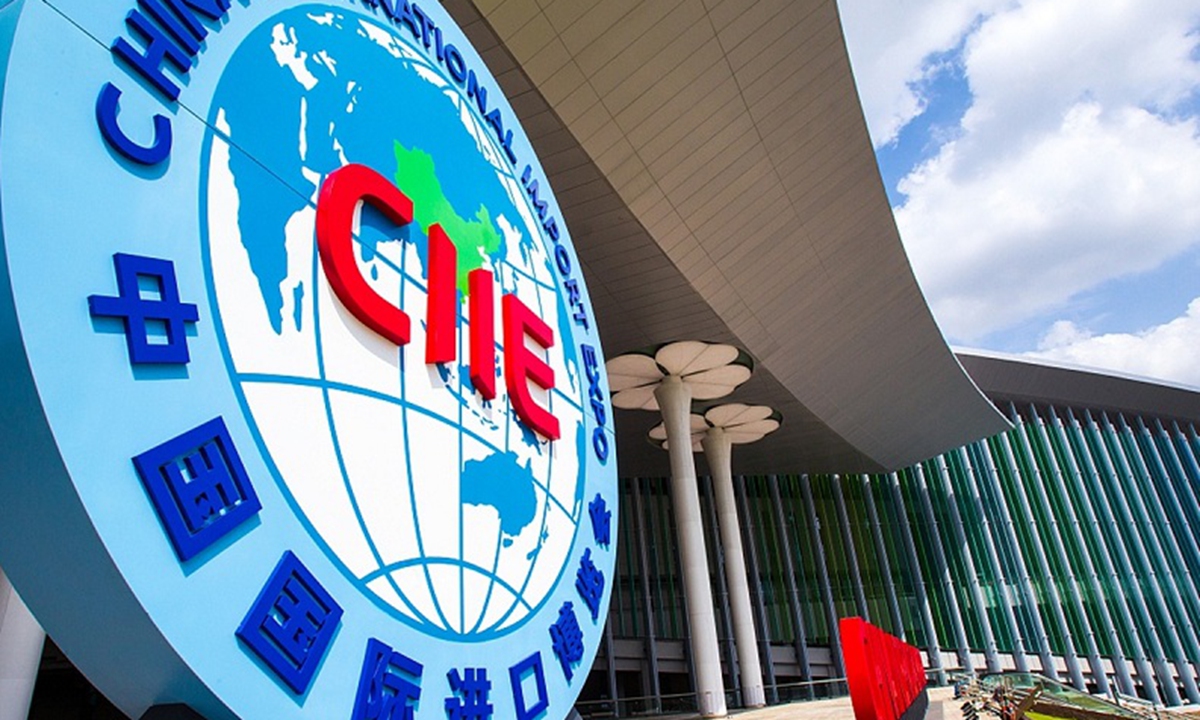CIIE shows China’s lead in globalization
By Chen Youjun Source: Global Times Published: 2020/11/4 18:26:25

Photo: VCG
The third China International Import Expo (CIIE), by far the world's first import-themed national exhibition, kicked off on Wednesday.
The holding of this physical event, first of all, represents China's triumphal containment of the novel coronavirus. Secondly, from the perspective of global economic development, it is a public good created by China to promote the development of free trade worldwide. Amid rising unilateralism and trade protectionism, the world needs liberal and cooperative spirit as well as driving forces for economic liberalization. China vigorously advocates and safeguards global free trade. As such, it should take practical actions to provide public goods to meet basic needs. CIIE, in this sense, is an effective platform.
The expo is an important international business summit for China to open its markets to the world and promote its reform and opening-up. It also provides opportunities for enterprises around the world to get involved more in China's reform and opening-up process.
By hosting the CIIE, China mainly wants to send the following signals. First, China hopes to act as a driving force and play a leading role with global economic and trade reforms. At the same time, China is willing to provide the impetus for the world economy to emerge from the pandemic shadow and achieve an overall recovery.
Second, in the context of the COVID-19 pandemic, China is emphasizing cooperation and joint endeavors. It hopes to use the CIIE as a platform to call for joint efforts to fight against the pandemic and assist the world so it can get out of the COVID-19 quagmire as soon as possible.
Third, China is firmly determined to further promote reform and opening-up measures. In fact, China has been making active preparations for further reform and opening-up both in terms of policy and strategy. The implementation of multiple pilot free trade zones and the master plan to build South China's Hainan Province into a free trade port, demonstrate how China is actively engaged in and pushing for deeper reforms and opening-up in some of its deep water zones. At CIIE, China also hopes to display its experience and achievements in reform and opening-up to the world. It wishes to make the world understand it better, and share news of its progress and future prospects.
In truth, China has rapidly been advancing reform and opening-up. But Western public opinion often tends to accuse China of not carrying out reforms fast enough. Or they say it lacks substance. This is not surprising. Some Westerners often view any China-related issues through biased and ideological lenses. To forge iron, one must be strong. The most important thing for China is to manage its own things well. If Western criticism can help stimulate or promote our reforms, it might not be a bad thing to listen to it.
More than 2,700 businesses from 120 countries and regions, including the US, attended the CIIE. The global economy is failing into a recession. Only the Chinese economy is seeing a strong rebound and recovery. It's fair to say that China has become the major, if not the only, driving force of global economic revival. Therefore, all major enterprises around the world have been hoping to reap dividends from the Chinese market.
The biggest aim of enterprises is to seek profits. Although some enterprises, such as the US companies, are facing political obstacles from their own government in doing businesses with China, they are still working very hard to expand investment in China or conduct business activities with China through their own channels.
The interest of foreign companies in China is driven by many factors. What attracts them most are the development of China's market economy, 1.4 billion consumers and a large and expanding middle class. These will inject enormous impetus for future development.
Under globalization, no enterprises can circumvent China's gigantic market. The scale and potential of the Chinese market has shaped foreign companies' perceptions of the Chinese economy. It goes without saying that it has built up their confidence in investing in the Chinese market.
Some argue that the pandemic will end globalization. However, the fact is that de-globalization is a non-issue. Globalization is inevitable today. It's driven by enterprises and commercial behaviors instead of policies. The pandemic may obstruct the development of globalization. Some countries may have short-term suspension of production or export stagnation. But in the long run, globalization can still develop on a high-speed track in the post-pandemic era.
China's role in globalization is changing. From a bystander to a participant today, China has become a leader in promoting globalization. This means China will play a bigger role, and offer more Chinese propositions on global issues for countries and regions around the world to negotiate the joint promotion and development of globalization.
The author is a research fellow on international political economics with the Shanghai Institutes for International Studies. opinion@globaltimes.com.cn
Posted in: VIEWPOINT